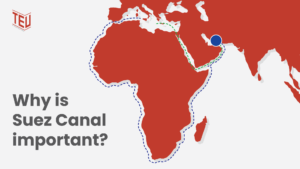The Suez Canal as a shortcut for global trade
The Suez Canal is considered one of the most remarkable engineering achievements in history. It represents a vital waterway for global maritime trade, as it’s the shortest maritime route between the Mediterranean and Red Seas.
The canal runs across the northern sector of Egypt’s Sinai Peninsula, linking the Red Sea and the Mediterranean, providing an important route for trading ships between Europe and Asia.
Since its opening in 1869, the Suez Canal has radically changed global trade by dramatically reducing the time and costs of ships transporting goods between East and West.
By avoiding the long and dangerous journey around the southern tip of Africa, the canal saves valuable time and fuel, making it an indispensable corridor for global trade.
Furthermore, the Suez Canal plays a vital role in shaping maritime shipping dynamics, influencing trade patterns, shipping routes and global supply chains, which shipping companies like Teu are looking for.
Its strategic location at the intersection of major trade routes makes it a focal point for international maritime traffic. With thousands of ships passing through its waters annually, the Suez Canal contributes significantly to stimulating international trade and boosting the global economy.
Among the prominent companies working to facilitate shipping operations through the Suez Canal, TEU Company stands out as one of the pioneers in this field.
In this professional review, we will explore the historical importance, operational aspects and economic impact of the Suez Canal, examining its deep connection to shipping and its continuing legacy as an essential component of global trade.
Economic impact of the Suez Canal
The economic impact of the Suez Canal is one of the most prominent aspects that make it a vital waterway in the world of maritime trade.
The canal has radically transformed global trade patterns and contributed significantly to strengthening the Egyptian and global economy in general.
Here are some of the major economic impacts of the Suez Canal:
- Increased trade: The Suez Canal provides a short and efficient route for commercial ships between the Red Sea and the Mediterranean, which encourages increased international trade and the exchange of goods between continents.
- Saving time and costs: Using the Suez Canal contributes to reducing time and costs for shipments, as ships can avoid a long trip around the southern tip of Africa, which enhances the efficiency of maritime transport and
- reduces operational costs.
- Enhancing national revenues: Transit fees and revenues generated from shipping operations through the Suez Canal are important sources of income for the Egyptian government, and contribute to financing development projects and enhancing the country’s economic stability.
- Supporting the services and logistics sector: The Suez Canal provides a suitable environment for the growth of the service sectors and the logistics industry, as the transit of ships requires support, insurance and customs clearance services, which creates job opportunities and enhances the activity of the relevant sectors.
In this way, the Suez Canal contributes significantly to promoting international trade and strengthening national economies, making it an essential element of the global economic system.
It may also help you:Challenges for shipping companies
The vital relationship between the Suez Canal and maritime shipping in global trade

The Suez Canal represents a vital link in the global supply chain and is considered a major factor in facilitating maritime shipping in global trade.
It provides a short waterway connecting the Red Sea and the Mediterranean, cutting time and reducing costs for commercial ships taking this route.
Below are some of the main relationships between the Suez Canal and shipping in global trade:
- Shortening distances: The Suez Canal is a short corridor that facilitates the crossing of ships between the Red Sea and the Mediterranean, which shortens sea journeys and saves valuable time for ships and shipments.
- Reducing costs: Thanks to the short distances it provides, the Suez Canal contributes to significantly reducing shipping costs, as ships can avoid long trips around the southern tip of Africa that take time and consume fuel.
- Improving logistics efficiency: The Suez Canal provides an ideal environment for improving logistics efficiency, as its location and ease of transit for ships provide opportunities to improve production schedules and accelerate the flow of goods.
- Enhancing global trade: Thanks to its vital role as a major waterway, the Suez Canal contributes to enhancing global trade in general, as it contributes to increasing the volume of trade exchange between countries and enhances global economic integration.
In this way, the Suez Canal plays a vital role in facilitating shipping and promoting global trade, making it an essential component of the global economic system.
Teu and The Suez Canal
The Suez Canal plays a vital role in facilitating the movement of shipping across the world, providing a short and efficient route between the Mediterranean and the Red Sea.
This canal is considered an essential transit channel for commercial ships, and contributes significantly to reducing costs and increasing the efficiency of shipping operations.
Through innovation and excellence, Teu plays a prominent role in facilitating shipping operations through the Suez Canal and other major shipping lanes.
The company uses the latest technologies and logistics practices to provide innovative and reliable shipping solutions, which contribute to achieving maximum efficiency and quality in the transport of goods overseas.
Thus, the Suez Canal and TEU Company remain pioneers in the field of maritime shipping, contributing to supporting global trade and stimulating the global economy in general.
This strategic partnership continues to facilitate the movement of goods across oceans, providing innovative logistics solutions that meet market needs efficiently and effectively.

